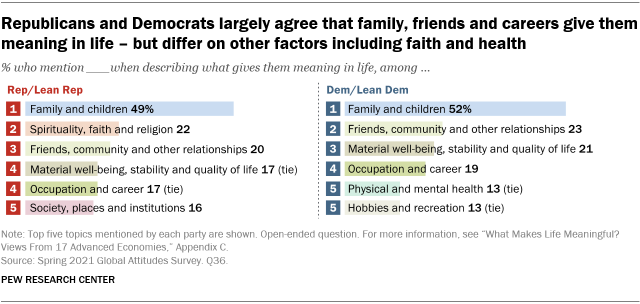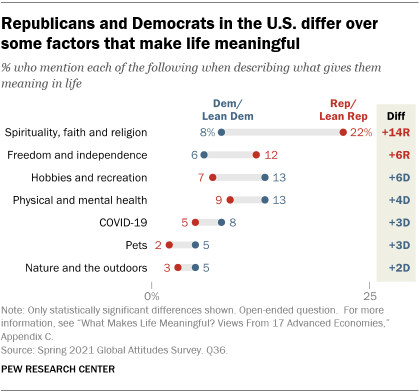what party do the large u.s. cities tend to support?

In the U.s., even the significant of life tin can take a partisan tinge.
In February 2021, Pew Research Center asked 2,596 U.S. adults the post-obit open up-ended question: "What nearly your life practise you lot currently find meaningful, fulfilling or satisfying? What keeps yous going and why?" Researchers then evaluated the answers and grouped them into the virtually commonly mentioned categories.
Both Republicans and Democrats are most likely to say they derive pregnant from their families, and they too commonly mention their friends, careers and material well-being. But Republicans and Democrats differ substantially over several other factors, including faith, freedom, health and hobbies.

In fact, even some of the words that partisans use to describe where they draw pregnant in life differ substantially. Republicans, forth with independents who lean to the Republican Political party, are much more likely than Democrats and Autonomous-leaning independents to mention words like "God," "freedom," "country," "Jesus" and "religion." Democrats are much more likely than Republicans to mention words similar "new," "canis familiaris," "reading," "exterior," "daughter" and "nature." (Democrats are about likely to mention "new" in the context of learning something new. But some also mention it in the context of new experiences, coming together new people or other forms of exploration.)
Below, we explore these partisan differences in more than item and await at how attitudes in the United States compare internationally, based on surveys conducted amongst xvi other publics in spring 2021.
This assay examines Americans' responses to an open-ended survey question well-nigh what gives them significant in life and explores how responses in the United States differ from those elsewhere in the globe.
In the U.Southward., Pew Research Middle conducted a nationally representative survey of 2,596 U.S. adults from Feb. 1 to 7, 2021. Anybody who took role in the U.Southward. survey is a member of the Centre'southward American Trends Panel (ATP), an online survey panel that is recruited through national, random sampling of residential addresses. This way near all adults accept a adventure of selection. The survey is weighted to exist representative of the U.S. adult population by gender, race, ethnicity, partisan affiliation, teaching and other categories. In the U.S., respondents were asked a slightly longer version of the question asked elsewhere: "We're interested in exploring what information technology means to live a satisfying life. Please take a moment to reflect on your life and what makes it feel worthwhile – then answer the question beneath equally thoughtfully every bit you can. What most your life practise you currently discover meaningful, fulfilling or satisfying? What keeps you lot going and why?"
The Center likewise conducted nationally representative surveys of 16,254 adults from March 12 to May 26, 2021, in sixteen advanced economies. All surveys were conducted over the phone with adults in Canada, Kingdom of belgium, France, Germany, Greece, Italia, the Netherlands, Spain, Sweden, the Uk, Australia, Japan, New Zealand, Singapore, South Korea and Taiwan. Responses are weighted to exist representative of the developed population in each public. Respondents in these publics were asked a shorter version of the question asked in the U.S.: "We're interested in exploring what it ways to live a satisfying life. What aspects of your life do yous currently find meaningful, fulfilling or satisfying?" Responses were transcribed past interviewers in the language in which the interviews were conducted.
Researchers examined random samples of English responses, auto-translated non-English responses and responses translated by a professional translation firm to inductively develop a codebook for the main sources of significant mentioned beyond the 17 publics. The codebook was iteratively improved via practice coding and calculations of intercoder reliability until a final selection of codes was formally adopted (see Appendix C of the full report).
To use the codebook to the full collection of xviii,850 responses, a team of Pew Research Centre coders and professional translators were trained to lawmaking English and non-English language responses, respectively. Coders in both groups coded random samples and were evaluated for consistency and accurateness. They were asked to independently code responses only afterwards reaching an acceptable threshold for intercoder reliability. (For more on the codebook, see Appendix A of the full report.)
Here is the question used for this assay, along with the coded responses for each public. Open-ended responses have been lightly edited for clarity (and, in some cases, translated into English by a professional firm). Here are more details about our international survey methodology and country-specific sample designs. For respondents in the U.S., read more about the ATP'southward methodology.
Words in the lead graphic were selected first past filtering to the tiptop 100 words that are distinctive of each party, as measured by a likelihood ratio comparing the proportion of responses from Democrats who mentioned each word versus Republicans who did and then, and vice versa. Words were and then filtered to the top 25 based on overall frequency inside each political party. Words shown are used at least 50% more often past those in one party relative to the other. Words were reduced to their root form and exclude 354 common English language "cease words."
In item 6 in this analysis, support for the governing political party is not the aforementioned as partisanship, but information technology is the all-time comparative measure across the 16 survey publics where partisan identification is asked (information technology is not asked in South Korea). Elsewhere in this analysis, nosotros rely on traditional measures of partisanship and look at how Democrats and independents who lean Democratic compare with Republicans and Republican leaners.
Mentions of political executives were identified by searching responses for item names as well every bit generic terms like "president" and "prime government minister" using case-insensitive regular expressions, a method for pattern matching.
Republicans are much more likely than Democrats to cite religion as a source of meaning in their life. People in both parties mention spirituality, organized religion and organized religion as a source of meaning, with specific references to participating in traditional religious practices (e.m., "attending church services"), every bit well as more general references to living a life informed past religion. One Republican woman, for instance, said, "My faith and the power to cull to exist thankful, optimistic and joyful are what keeps me going."

Overall, though, effectually 1-in-5 Republicans and Republican-leaning independents (22%) say spirituality, organized religion or religion gives them significant in life, compared with simply 8% of Democrats and those who lean to the political party. Evangelical Protestants – a heavily Republican group – are especially likely to mention faith and religion every bit a source of meaning (34%). Smaller shares practice then in other religious groups, including those following the historically Blackness Protestant tradition (eighteen%), mainline Protestants (13%), Catholics (11%) and those who draw themselves every bit atheist, doubter or "nothing in particular" (two%).
Republicans are as well particularly likely to mention God and Jesus. One Republican man said, "Life without Jesus is meaningless, sad and hopeless. It is only through a daily relationship with Christ that joy, love, peace and goodness can be found."
Republicans are more probable than Democrats (12% vs. half-dozen%) to bring up freedom and independence as something that gives their life meaning. Some people mention freedom in the personal sense, focusing on their ability to live the way they want, their work-life balance, or having or wanting gratis time. One Republican woman said, "I like being able to accept the freedoms to brand my own decisions and to exist able to contribute to my country. Beingness able to express my views without worrying about retribution."
Others emphasize freedom in a more than political sense, highlighting things like liberty of spoken language and organized religion. One Republican man had this to say: "Keeping the true meaning of being an American, country showtime, defending the Constitution and freedom of speech."
Democrats are more likely than Republicans to cite physical and mental health as office of what gives them meaning in life – and they mention the COVID-19 pandemic more than ofttimes. When the survey was fielded in February, some 13% of Democrats and 9% of Republicans mentioned health – whether people'due south current state of well-being, their practice regimens or the steps they have to lead good for you lives. For some, wellness is as well a precursor for other sources of meaning. One Democratic man put information technology this mode: "The biggest thing for me is wellness. If y'all don't have your wellness you don't accept much. Everything else tin can come after but yous have to accept your health."
One-in-v Americans who mentioned health too mentioned the COVID-19 pandemic, including 23% of Democrats and 17% of Republicans. And while Democrats and Republicans were about equally likely to mention COVID-nineteen in the context of difficulties or challenges they faced, the specifics varied by political party. One Republican woman, for instance, said, "My family is my only driving force. Beingness forced into a yearlong quarantine isn't making that easy." On the other hand, a Democratic woman said, "Though COVID is a constant worry, I have faith we will come through eventually and that President Biden will be able to unite our country."
Democrats were also much more probable than Republicans to mention COVID-19 in the context of the state and where they live (23% vs. six%) – suggesting that for Democrats, the pandemic has more of a societal dimension than for Republicans.
Democrats are more likely than Republicans to detect significant in hobbies and recreation, nature and the outdoors, and pets – though pocket-sized shares of Americans overall mention these things. Overall, only 1-in-ten Americans say hobbies are a source of pregnant in their life, and even fewer say the same about nature (4%) or pets (3%). But Democrats are about twice as likely equally Republicans to cite each one every bit a source of significant in their life. Amidst Democrats, liberals are more likely than moderates and conservatives to observe meaning in hobbies, nature and pets, but there are few ideological differences amidst Republicans on these topics.
Conservative Republicans are particularly likely to mention their country or where they live every bit a source of meaning. Among Republicans, sixteen% mention the land, patriotic and national sentiments, or the country of America's economic system or society as a source of meaning, compared with 12% of Democrats. But conservative Republicans (21%) are especially likely to mention society relative to moderate and liberal Republicans (9%), while there are no major ideological differences amongst Democrats.
1 Republican man offered a short and simple description of what gives him meaning in life: "Being born in America." And one Republican woman said, "I am first-generation American and I remember it is the greatest state in the world, and I am very grateful to live here."
Partisanship is associated with Americans' views about the meaning of life more than it is in other parts of the globe. In most of the 17 publics surveyed, those who support the governing party and those who exercise not differ little when it comes to the factors that bring them meaning in life. Take the United Kingdom: Those who support the governing Conservative Party are simply equally likely equally those who do not to mention freedom, religion and other factors as sources of meaning in their life. In fact, the sole outlying factor – out of all topics that the Middle coded – is cloth well-being: Bourgeois Party supporters in the Great britain are slightly more likely than nonsupporters to say this brings them pregnant (16% vs. 10%).
Looking more closely at the specific topic of freedom, the partisan differences that are found in the U.South. are by and large not on display elsewhere. In fact, the only other identify where partisan differences emerge over liberty is Taiwan, where supporters of the governing Democratic Progressive Party (DPP) are more than likely than nonsupporters to mention it every bit a source of meaning (nineteen% vs. x%).
Though few mention government leaders when discussing the meaning of life, Americans are more than likely to do and then than people in other countries. In the U.S., 2% of people mentioned President Joe Biden or former President Donald Trump – often by name – when answering the Centre'due south question about where they observe meaning in life. (The survey was conducted shortly after Biden was inaugurated as president.)
One Republican adult female, for instance, said that what gives her significant in life is "the forcefulness and backbone taught to me by President Trump – the meaning of standing up fiercely in the face up of idiocy." On the other hand, a Autonomous man historic Trump's absenteeism from office, declaring that he finds meaning in life through "chore satisfaction. Plenty complimentary time and money to enjoy life. Less racial inequality. Less Donald Trump and his fanatics."
In every other place surveyed by the Center, no more ane person – substantially 0% of the overall sample – mentioned a national leader such every bit a prime minister or president past name, or even the words "prime government minister" or "president."

Laura Silver is a senior researcher focusing on global research at Pew Research Center.
Source: https://www.pewresearch.org/fact-tank/2021/11/22/both-republicans-and-democrats-prioritize-family-but-they-differ-over-other-sources-of-meaning-in-life/
0 Response to "what party do the large u.s. cities tend to support?"
Post a Comment